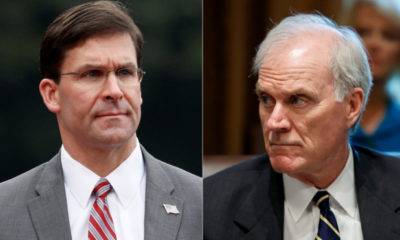World
Clinton leads Trump by 2 points: Poll
 Washington : Democratic presidential nominee Hillary Clinton is leading Republican rival Donald Trump by 2 percentage points among likely voters, according to a national Fox News poll.
Washington : Democratic presidential nominee Hillary Clinton is leading Republican rival Donald Trump by 2 percentage points among likely voters, according to a national Fox News poll.
In a four-way race, Clinton earned 45 per cent support in the survey, which was conducted from Tuesday to Thursday, while Trump received 43 per cent. Five per cent of those surveyed said they support Libertarian Gary Johnson, and 2 per cent said they support the Green Party’s Jill Stein, the poll revealed on Friday.
In the poll, Trump was favoured by men (+11 points), whites (+19), and whites without a college degree (+33).
Clinton led among women (+13 points), African-Americans (+74), and voters under age 30 (+17).
She was also ahead by 11 points among the one-in-five who have already voted (50-39 per cent).
They split the support of whites with a college degree: Trump got 45 per cent to Clinton’s 42 per cent.
Both candidates consolidated their bases, but Clinton outperforms Trump: she gets 90 per cent among Democrats and he gets 85 per cent of Republicans, the poll showed.
Some 74 per cent of voters said the FBI investigation intoC linton’s use of a private email server while she was Secretary of State would not make a difference to their vote, and 4 per cent said it makes them more likely to support her.
Yet 21 per cent said it makes them less likely to vote for her, including 37 per cent of Republicans and 21 per cent of independents. Among Democrats, 5 per cent said it made them less likely to support Clinton, while 7 per cent said it made them more likely.
While both candidates remained unpopular, Clinton’s lost her advantage here. Her net negative rating is 13 points (43 favourable vs. 56 unfavourable).
Last week she was underwater by 8. At the same time, Trump’s net negative 12 points (43 favourable vs. 55 unfavourable) improved a bit from negative 14 a week ago, the poll showed.
Roughly 15 per cent of likely voters dislike both Clinton and Trump.
Most of Clinton’a supporters remain confident in their candidate, as 90 per cent think it will be Madame President, down slightly from 93 percent in mid-October.
At the same time, Trump’s supporters felt more confident: 69 per cent thought he would win, up from 56 per cent.
The Fox News Poll was based on landline and cellphone interviews with 1,211 randomly chosen registered voters nationwide.
The survey included results among 1,107 likely voters. The margin of sampling error is plus or minus 2.5 percentage points for results among registered voters and plus or minus 3 points among likely voters.
World
Lockdowns in China Force Urban Communities to Defy Censorship and Vent Frustration Online

Shanghai’s rich middle class is leading a wave of online dissent over the strict and prolonged lockdowns imposed in various parts of the country. Chinese internet censorship is struggling as patience is wearing thin in many urban centers, coming up with creative forms of online protests.
Social Media Posts Revealing Lockdown Tension in Shanghai
Drawn-out lockdowns are nothing new in China as authorities insist with the nation’s zero-Covid policy since the start of the pandemic. Currently over This time around, however, metropolitan areas like Shanghai are increasingly difficult to keep quiet, given that its more than 25 million residents have seen weeks of total isolation along with food shortages and many other service interruptions.
Dozens of towns and reportedly over 300 million Chinese citizens have been affected by lockdowns of different severity. As expected, urban netizens have been most outspoken over their difficulties by finding creative ways to get around state censorship and bans placed on topics, news comments and spontaneous campaigns.
Shanghai residents have been using mobile proxies and hijacking seemingly unrelated hashtags to talk about healthcare issues, delivery failures and the overall severity of their situation. The “positive energy” that the Chinese government wants to transmit during the recent prolonged series of lockdowns does not come naturally to those counting food supplies and online censors are working hard to filter words, trending topics and undesired social media sharing.
WeChat groups and message threads are under constant monitoring. Posts questioning the zero-Covid approach have been quickly deleted, including by leading Chinese health experts like Dr. Zhong Nanshan. Video footage is soon censored and protests and investigations are quickly made to disappear.
Where this has not worked, officials have exposed banners with warnings and outright threats like “watch your own mouth or face punishment”, while drones have been patrolling the city skies. Yet, if anything, this has led to further tensions and unspoken confrontation with Shanghai’s educated and affluent middle class.
Creative Online Solutions Harnessing Civic Energy
Announcements by Chinese social media that they would be publishing the IP addresses of users who “spread rumors” have not helped either. Tech industry research has shown that much of Asia’s tech-savvy population has a habit of using mobile proxies and other privacy tools, quickly finding workarounds to browse the internet freely and talk to the world about the hottest topics.
The sheer volume of forbidden posts is already a challenge for the very censorship system, experts explain. Unable to track all trending hashtags, state workers overlook topics that speak about the US, Ukraine or other popular news. Linking human rights elsewhere to their situation, Chinese online dissidents establish their informal channels and “hijack” the conversation to share personal or publicly relevant information about the Covid suppression in their town.
Sarcastic and satirical posts still dominate. Others hope to evade the censors by replacing words from famous poems or the national anthem. One thing is certain – social media, when harnessed with the right creativity, has proven its ability to mount pressure on the government in even some of the most strictly controlled tech environments like China.























